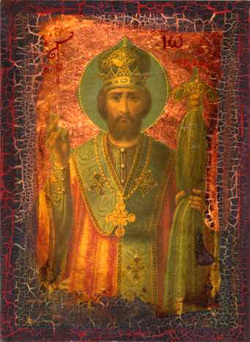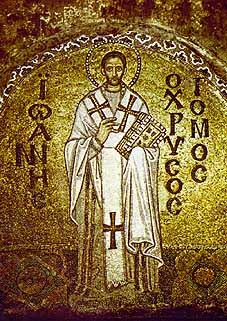
Some bishops being assembled in a Council at Chalcedon, which Council the Saint held to be neither lawful, nor public, although he was commanded to go there, he refused. Whereupon Eudoxia, striving earnestly against him, caused him to be sent into exile. Soon after, however, the people of the city rose, and demanded his recall, and he was then brought back again amid great public rejoicings. Nevertheless he ceased not to war against vice, and absolutely forbade the celebration of public games round the silver statue of Eudoxia in the square outside the Church of the Eternal Wisdom. Upon this, a party of bishops, who were enemies to him, banded together, and obtained that he should be banished again, which was done accordingly, amid the lamentations of widows and the poor, who felt as if they were being deprived of a common father. During this exile, it almost passeth belief how much Chrysostom suffered, and how many souls he turned to the faith which is in Christ Jesus.
At this time a Council was assembled at Rome, wherein Chrysostom's restoration to his See was decreed by Pope Innocent I, but meanwhile, he was suffering great hardships and cruelties on his journey at the hands of the soldiers who had him in charge. As he passed through Armenia he prayed in the Church of the holy martyr Basiliscus, and the same night that blessed conqueror appeared to him in a vision and said: Brother John, tomorrow thou shalt be with me. On the next day, therefore, he received the Sacrament of the Eucharist, and, arming himself with the sign of the Cross, resigned his soul to God, it being the 14th of September. As soon as he was dead a furious hailstorm took place at Constantinople, and after four days the Empress died. The Emperor Theodosius, the son of Arcadius, brought the body of John Chrysostom to Constantinople with great state, and numerously attended, and on the 27th of January, laid it with magnificent honours in the grave, beside which he prayed for the forgiveness of his own father and mother. The holy body was afterwards taken to Rome, and is now buried in the Vatican Basilica. The number, devoutness, and brilliance of St. John Chrysostom's sermons and other writings, his acuteness in exposition, and the close aptness of his explanations of Holy Scripture, have been and are the object of universal wonder and admiration, and often seem not unworthy to have been dictated to him by the Apostle Paul, for whom he entertained a wonderful devotion. This most outstanding Doctor of the Church universal was proclaimed and appointed the heavenly patron of sacred orators by the Supreme Pontiff, Pius X.





